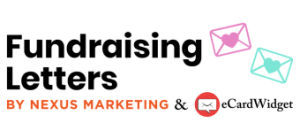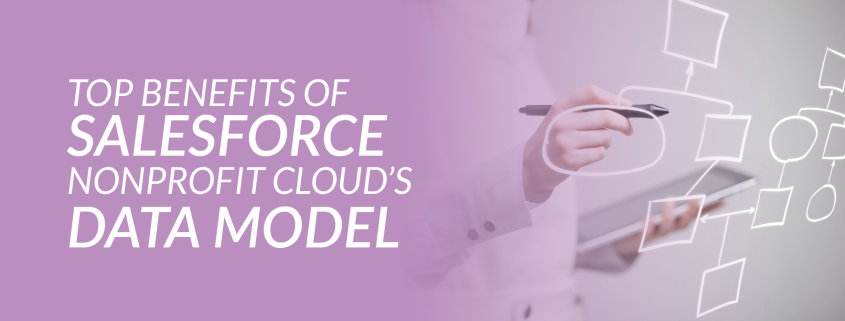Top Benefits of Salesforce Nonprofit Cloud’s Data Model
Nonprofit Cloud (NPC) is a Salesforce product designed for nonprofit organizations, offering a suite of tools tailored to their needs. Built into the Salesforce platform core, it is compatible with other Salesforce products, apps, and integrations. For example, you might integrate it with Experience Cloud or Marketing Cloud Account Engagement (MCAE) to create personalized, interactive experiences and communications.
NPC’s data model makes this flexibility and interoperability possible. Whether you’ve never used Salesforce before or are thinking about switching from NPSP to Nonprofit Cloud, it’s essential to understand data models and how they impact your CRM.
In this guide, we’ll explore data model basics and the benefits NPC’s data model offers.
What is a data model?
A data model organizes and structures data, standardizing how various elements relate to one another. Without one, data would be disorganized and virtually unusable. For example, a nonprofit might leverage standard Salesforce objects like “Contacts” to track information about donors, volunteers, and other supporters.
Data models give your information meaning and make it easy to identify trends and relationships. Within Salesforce, data models are built on these basic elements:
- Records, which are the pieces of data stored in fields. So, the category “Donor Name” would be the field, and the name “Anna Smith” would be the record.
- Fields, which are data elements stored within an object. The Gift Entry object contains fields like campaign ID, date of transaction, gift amount, and donor contact information.
- Objects, which serve as tables or containers for information. For example, a Gift Entry object would contain information about a specific gift. Salesforce offers standard objects, which are pre-built and included in the system, and custom objects, which nonprofits can create to record information unique to their organization.
Using these elements, your CRM organizes your data. When you collect new data or generate a data report, your CRM will be able to locate the correct information by identifying the objects, fields, and records you need.
What are the benefits of NPC’s data model?
Each Salesforce solution uses data elements to structure information, and those structures can be set up differently to address various needs. For example, Fíonta clarifies that Nonprofit Success Pack (NPSP) is a collection of apps configured to meet nonprofit needs while NPC is an Industry Cloud built on the Salesforce platform core. These differences have implications for each solution’s data model.
While NPSP operates using a single data model, NPC’s complex system requires separate data models for each of its features, including fundraising, program management, and more.
Centralized data.
NPC’s data model and its status as an Industry Cloud make it easy to connect with other Salesforce products. This means that no matter what Salesforce tools you use to engage supporters, whether through your website or a third-party SMS marketing tool, you can funnel that data directly to your CRM.
Data consolidation can enhance security and data hygiene, which Deep Sync defines as “the practice of making sure the information you collect is correct.” Because staff won’t need to transfer data manually, you can reduce instances of input errors, duplicate entries, data silos, and outdated information. For added protection, Salesforce offers tools that can automatically audit and clean datasets.
Enhanced compatibility.
NPC’s data model pairs seamlessly with other Salesforce products, offers extensive customization options, and provides a scalable architecture. This means organizations using NPC can:
- Integrate their platform smoothly with other Industry Clouds
- Access common components like OmniStudio
- Provide consistent, streamlined user experiences
- Report on and analyze data consistently
- Improve collaboration and efficiency across teams, even if they use different NPC systems or other Salesforce tools
Nonprofit Cloud also makes integrating with third-party tools easy. Select from the native and integrated solutions on the AppExchange to fill any gaps in your platform. To manage complex integrations or get guidance on selecting apps, consider working with a technology consultant.
Significant flexibility and customization options.
Because NPC is designed for nonprofits, it is well-equipped to manage most nonprofit operations. However, your organization likely faces unique challenges or has special, program-specific workflows that customization can assist with.
For instance, if a nonprofit conducts outreach and enhances donor development through regular community events, it might create custom objects to track the success of those events. Along with these objects, the organization could create new automated workflows and build custom dashboards.
Keep in mind that there is such a thing as too much customization. Adding too many custom elements could impact the platform’s ability to work well with other apps and clouds. This can result in technical debt, or the cost of reworking your solution in the future as a result of choosing the faster solution over the more effective and sustainable one. Use custom objects sparingly, and exhaust the list of standard and included objects first.
Another option is to look for apps built on the Salesforce platform. For example, NPC doesn’t offer dedicated volunteer management or event registration tools. Rather than spending time and resources cobbling together a custom solution, look for a quality third-party app that integrates with Salesforce.
Ease of use for staff members.
NPC can save your staff members’ time and energy. The platform offers guided flows, or automated workflows that streamline repetitive tasks like recurring gift entry. Because NPC is designed for nonprofits, it provides out-of-the-box features for core nonprofit processes. Additionally, unified data makes analyzing trends simple and ensures your insights are accurate.
When a solution is easy to use and fits into or improves existing workflows, staff members will be much more likely to adopt the technology. If you plan to implement or migrate to NPC, work with a specialized Salesforce consultant. They can help you train staff, encourage adoption, and learn ways to boost efficiency and maximize your CRM investment.
Salesforce also offers its own free training resources and communities, such as the Salesforce Trailhead.
Nonprofit Cloud is a powerful, comprehensive tool designed specifically for nonprofit organizations, and it’s data model offers unique advantages over other nonprofit CRMs. Using the knowledge in this guide, your organization can take full advantage of NPC, enhance its data quality and security, boost efficiency and collaboration, and create a tailored system that grows with you.




